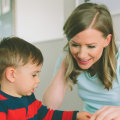Speech makes the sounds that become words the physical act of speaking. Language is our system of using words to communicate. It includes using words and gestures to say what we want to say and understanding what others are saying. In everyday life, the terms “speech” and “language” are often used interchangeably.
However, when health professionals use those terms, they're actually describing two different things. For example, when a speech-language pathologist says that someone has a “speech delay,” it's different from saying that someone has a “language delay.” Discourse refers to verbal communication and to the characteristics and functions that influence the clarity of a person's verbal expression. Parents play a critical role in their children's speech and language development, and the most important thing is to make sure they take advantage of every opportunity to educate their child and model the behavior they are trying to create. Children learn speech and language skills by watching, hearing, and imitating what they hear and see.
If you're wondering if speech pathology will help your child, the good news is that speech-language pathologists are highly qualified professionals with experience in helping children with speech and language delays or disorders. Language is the method used by human beings to communicate with each other, often with words and symbols used consciously by a group in a structured or conventional way. Speech/language pathology is about helping children learn to speak and communicate clearly, vital skills for the present and the future. On the contrary, since language is about meaning, a child with a language delay or disorder may have difficulty understanding what is being said or have a limited vocabulary to communicate their needs, desires, and thoughts.
Speech is produced using the anatomy of the mouth and respiratory tract (including the lungs, vocal cords, lips, and tongue) in a highly coordinated way to create sounds that make sense to the people who hear them. In children, a speech delay or disorder usually occurs with errors in the sound of speech that affect the clarity of speech. You can find a speech-language pathologist on your own or ask your healthcare provider to refer you to one. Learning happens best when children are relaxed and entertained, so make your speech and language games fun and interesting and never force your children to talk.
Although children develop speech and language at different rates, certain skills generally begin to emerge at certain ages. But did you know how important those “simple sounds” are? From infancy, children explore the mouth and begin to make sounds, which eventually become recognizable speech sounds, and then the sounds of speech become language.







